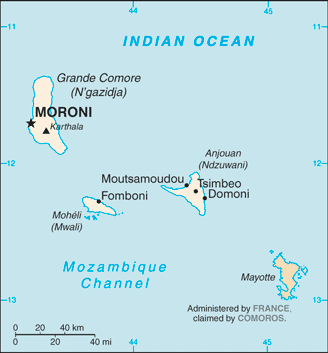Welcome to the Virtual Education Wiki ~ Open Education Wiki
Comoros
by Paul Bacsich for Re.ViCa. Updated by Graham Clarke for VISCED
For entities in Comoros see Category:Comoros
Experts situated in Comoros
Comoros in a nutshell
This material is taken from http://en.wikipedia.org/wiki/Comoros The Comoros (Arabic: جزر القمر, Juzur al-Qumur), officially the Union of the Comoros (French: Union des Comores, Arabic: الإتّحاد القمريّ, Al-Ittiḥād al-Qumuriyy) is an island nation in the Indian Ocean, located off the eastern coast of Africa on the northern end of the Mozambique Channel between northern Madagascar and northeastern Mozambique. The nearest countries to the Comoros are Mozambique, Tanzania, Madagascar, and the Seychelles. Its name derives from the Arabic word qamar ("moon").
At 2,235 km² (863 sq mi) the Comoros is the third smallest African nation by area; and with a population estimated at 794,683 (July 2011 est.) it is the sixth smallest African nation by population (though it has one of the highest population densities in Africa), and is the southern most member state of the Arab League.
The country officially consists of the four islands in the volcanic Comoros archipelago: Ngazidja (French: Grande Comore), Mwali (French: Mohéli), Nzwani (French: Anjouan), and Mahoré (French: Mayotte), as well as many smaller islands.


However, the government of the Union of the Comoros (or its predecessors since independence) has never administered the island of Mayotte, which France considers an overseas community and still administers. Since Mayotte was the only island in the archipelago that voted against independence from France, and France has vetoed United Nations Security Council resolutions that would affirm Comorian sovereignty over the island, control was never passed to the Comoros.
The country is notable for its diverse culture and history, as a nation formed at the crossroads of many civilizations. It has three official languages—Comorian (Shikomor), Arabic, and French, and it is the only state to be a member of each of the African Union, Francophonie, Organisation of the Islamic Conference, Arab League, and Indian Ocean Commission, among other international organizations. However it has had a troubled history since independence in 1975, marked by an inordinate number of coups d'état.
With fewer than a million people, the Comoros is one of the least populous countries in the world, but is also one of the most densely populated, with an average of 275 people per km² (712 people per sq mi). In 2001, 34% of the population was considered urban, but that is expected to grow, since rural population growth is negative, while overall population growth is still relatively high. Major urban centers include Moroni, Mutsamudu, Domoni, Fomboni, and Tsémbéhou.
The islands of the Comoros share mostly African-Arab origins. Sunni Islam is the dominant religion, representing as much as 98% of the population. Although Arab culture is firmly established throughout the archipelago, a minority of the citizens of Mayotte (the Mahorais) are Roman Catholic and have been strongly influenced by French culture.[38] Malagasy and Indian minorities also exist, as well as Creole-speaking minorities mostly descended from Réunionnaise. Chinese peoples are also present on Mayotte and parts of Grande Comore (especially Moroni).
The most common language is Comorian, or Shikomor, a descendant of Swahili with Arabic influences. Shingazidja, Shimwali, Shinzwani, and Shimaore are the local dialects spoken on each of the islands, Ngazidja, Mwali, Nzwani, and Mahoré, respectively. French and Arabic are also official languages, along with Comorian. Arabic is widely known as a second language, being the language of Quranic teaching, and French is the language of all other formal education. Malagasy is also spoken by a small number of Malagasy immigrants.[39] About fifty-seven percent of the population is literate in the Latin alphabet, more with the Arabic alphabet; total literacy is estimated at 62.5%. Comorian has no native script, but both Arabic and Latin scripts have been used.
Education in Comoros
Almost all of the educated populace of the Comoros has attended Quranic schools at some point in their life, often before regular schooling. Here boys and girls are taught about the Quran, and memorize it. Some parents specifically choose this early schooling to offset French schools children usually attend later. Since independence and the ejection of French teachers, the education system has been plagued by poor teacher training and poor results, though recent stability may allow for substantial improvements.
Education in Comoros is free and mandatory from 7-15 (8 years).
School-level education
Pre-primary level Beginning age 5, children attend Koranic school for two to three years.
Primary level Begins at either age seven, lasting for five years, or age six lasting for six years.
Secondary level Secondary education is a seven year programme.
Further and Higher education
Comoros has no university but instead has post-secondary education, which in 1993 involved 400 students, is available in the form of teacher training, agricultural education training, health sciences, and business. [1]
Universities in Comoros
Polytechnics in Comoros
Colleges in Comoros
Education reform
Administration and finance
Quality assurance
Information society
ICT in education initiatives
Virtual initiatives in schools
Virtual initiatives in post-secondary education
The University of the Comoros has been included in the recently established Virtual University for Small States of the Commonwealth (VUSSC) programme promoted by the Commonwealth of Learning. The VUSSC is a network committed to the collaborative development of free content resources for education. The university had 2,600 students in 2005-06
For more see the infoDev 2007 report at http://www.infodev.org/en/Publication.394.html
Lessons learnt
References
For OER policies and projects in Comoros see Comoros/OER